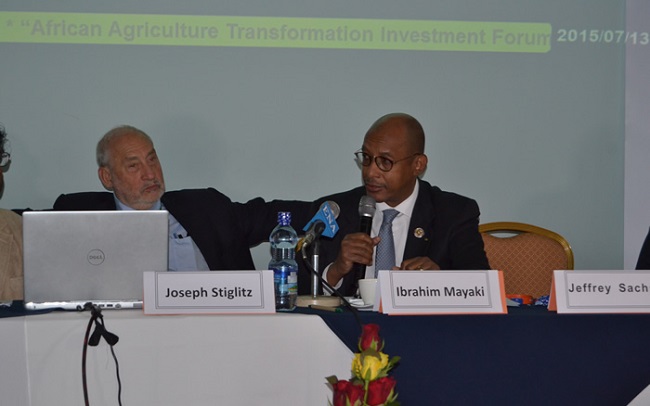Africa’s infrastructure investment a top priority

Chief Executive Officer of the NEPAD Agency, Dr Ibrahim Mayaki, highlighted that Africa’s challenge was not a lack of resources, but a lack of bankable projects.
Closing Africa’s infrastructure gap is a top priority in order to put the continent on a path for double digit growth and sustainable development. This is according to world-renowned professor of economics, Jeffrey Sachs.
“There is no choice, Africa needs 10 per cent per year of economic growth in the next 15 years,” Professor Sachs said. The only way to achieve this, according to him, was to focus on large-scale investments in trans-national infrastructure projects in power, roads, broadband, and other core regional infrastructure needs.
Professor Sachs spoke Monday on the side-lines of the Third Financing for Development Conference in Addis Ababa, Ethiopia. The event themed “Unlocking Public and Private Capital for African Infrastructure” was organised by the New Partnership for Africa’s Development (NEPAD) Agency and Sustainable Development Solutions Network (SDSN).
Thousands of delegates have descended on Addis Ababa to set the new financing architecture for a new global partnership. Its outcomes will also address the issue of means of implementation, referring to the ‘how’ the goals set out in the post-2015 development agenda can be achieved.
For Africa to realise the 2030 timeframe, Professor Sachs, Director of the SDSN and Special Advisor to UN Secretary-General Ban Ki-moon on the Millennium Development Goals, urged the global community to rally around the NEPAD agenda, as the continent’s strategy for implementing cross-border infrastructure projects. “We need to help support NEPAD achieve its goals”, he said.
The NEPAD Agency has identified Africa’s most important infrastructure needs within the context of the Programme for Infrastructure Development in Africa (PIDA), which provides the framework to implement 51 priority programmes and projects in the sectors of energy, transport, broadband and trans boundary water.
Chief Executive Officer of the NEPAD Agency, Dr Ibrahim Mayaki, highlighted that Africa’s challenge was not a lack of resources, but a lack of bankable projects. “We need to invest in the capacity to invest”. It is about proposing structured projects, he said. The CEO mentioned the complementary instruments that have been developed to build the necessary capacity for early-stage project preparation and the Africa50 Fund to finance the implementation of PIDA and other regional infrastructure projects. Dr Mayaki also underscored the important role of Regional Economic Communities in providing the enabling environment for project implementation, through harmonised policies and regulatory frameworks.
Speaking on the issue of how to crowd in investment, Professor Sachs encouraged African economies to forge partnerships with East Asia, tap into capital markets and strengthen continental bodies such as the NEPAD Agency and African Development Bank.
On his part, Nobel laureate in economics and University Professor at Columbia University noted that financial markets have “failed to translate pools of savings into productive investment”. There was need to better match these large-scale resources with financing priorities of developing countries. “The world has the resources with which to do this. Allocating more of these resources to inclusive development would be good for the global economy,” he said.
The best way for Africa to achieve its infrastructure goals was to tap into a Global Infrastructure Investment Platform (GIIP), Professor Stiglitz said. The objective of GIIP was to put forward an ambitious proposal that would allow long-term investors to ramp up their infrastructure asset holdings, with an allocation target of up to 10% of assets under management over a 15 year horizon.
The event brought together leading representatives from the private and public sector, as well as global think tanks.
The NEPAD Agency, SDSN, UN Conference on Trade and Development (UNCTAD) and Washington-based think tank Brookings Institution, agreed to set up a working group that will move Africa’s regional infrastructure financing agenda forward.
African Press Organization
Photo: nepad.org

